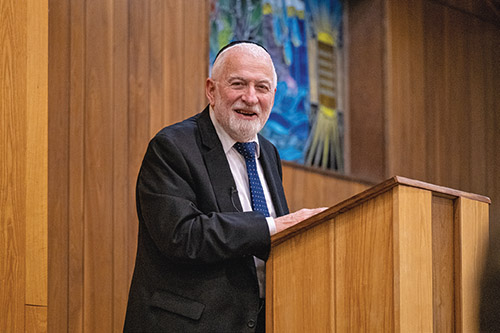


(Courtesy of Torahweb.org) The evening of Sunday, September 15, over 150 people gathered in Bnai Yeshurun in Teaneck for the latest event organized by TorahWeb.org, featuring Rav Mayer Twersky and Rav Hershel Schachter.
Rav Twersky spoke first, and discussed “The Place of Hard Work in Avodas Hashem.” Rav Twersky highlighted that while the society we live in sees taking it easy and “living on easy street” as a goal, the Torah teaches us, “adam l’amal yulad,” i.e. that we were born to work hard and exert ourselves in Avodas Hashem. Two concrete examples were given: exertion in Torah learning and in teshuva, a strong focus in the next few weeks.
Regarding Torah learning, Rav Twersky pointed out that we mistakenly think that were we given the abilities of the Vilna Gaon, Rav Chaim Soloveitchik, or Rav Yosef Dov Solovetichik, etc., we would find Torah learning to be so easy. In truth, though, they too worked very hard when learning; they simply worked hard in understanding at a higher level than we work on at our level. Hard work in learning, however, is universal. Teshuva, Rav Twersky explained, is not meant to be an easy process. On the contrary – when doing teshuva we have to exert ourselves emotionally and work very hard, if the changes we hope to make are to last.
Rav Hershel Schachter addressed the topic of “Being a Part While Staying Apart: Spiritual Growth in the Midst of a Confused Society.” Rav Schachter explained that being a centrist Jew does not mean only observing some halachos while ignoring others, rather it means being aware of the reality around us so that we can accurately apply the halacha in all situations. Torah is eternal and immutable, but the metzius – the facts on the ground – do change over time, and sometimes when the facts change, a different part of Shulchan Aruch will then be applicable and thus the behavior mandated by halacha will change as well. Rav Schachter highlighted that in his public addresses Rav Solovetichik often called the society we live in “neurotic.” Rav Schachter commented that society is no longer neurotic, but has gone further and become psychotic, and as such we can’t blindly adopt the values and behaviors of the society around us. We must be careful to evaluate everything through the lens of the Torah, only adopt those values and behaviors of which the Torah approves, and whenever necessary be different than those around us and “swim against the current.”
Rav Schachter encouraged the women of our community to be more careful about dressing in a tznius-dik way, stating that tznius is one of the most important mitzvos in the Torah. He also highlighted that the Agudah community is always learning so much Torah and making big siyumim, and we should do so as well.
Like any short synopsis, this brief summary is missing many ideas and details expressed by Rav Schachter and Rav Twersky, and the reader is strongly encouraged to listen to or watch the complete shiurim on www.TorahWeb.org.�









